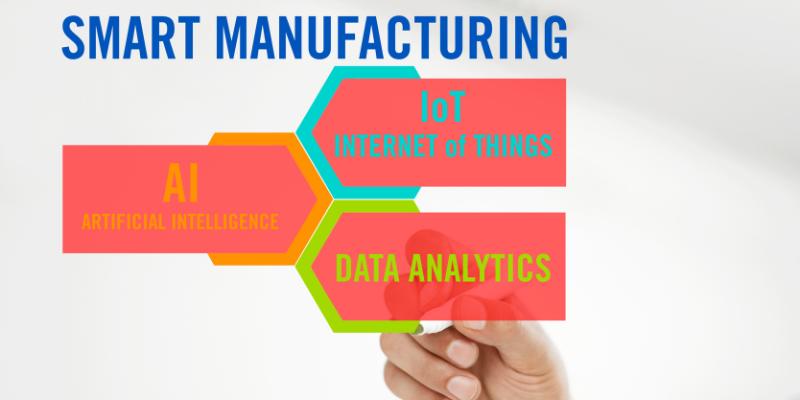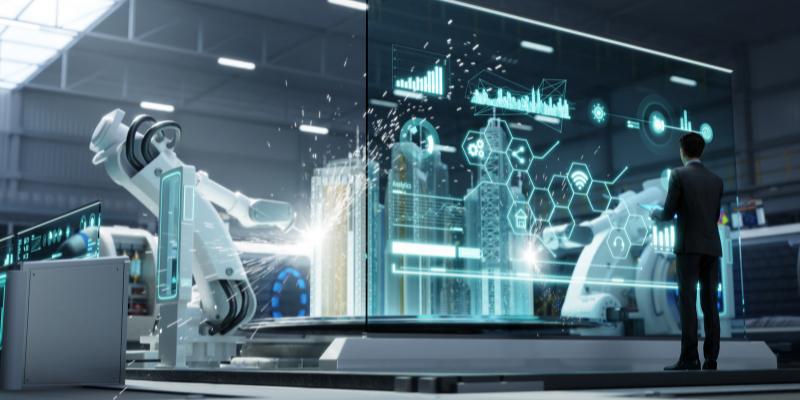Digital Transformation in Manufacturing: Boosting Efficiency and Competitiveness
Digital transformation in manufacturing has become a pivotal topic in recent years, as Industry 4.0 continues to reshape how goods are produced and delivered. This modern era of innovation, powered by new technologies such as artificial intelligence (AI), the Internet of Things (IoT), and advanced analytics, is unlocking new opportunities for growth and efficiency within the sector. Embracing digital transformation enables manufacturers to remain competitive and responsive amidst constantly evolving market demands and customer expectations.
As manufacturers adapt to this dynamic environment, the integration of digital technology throughout their operations is vital to realizing the full benefits of digital transformation. Companies that successfully implement digital advancements can improve productivity, streamline processes, and create more agile and resilient facilities. However, navigating the complex landscape of emerging technologies and identifying the best solutions for specific business needs can present challenges for many manufacturing organizations.
By understanding the implications and potential of digital transformation in manufacturing, decision-makers can better strategize and invest in the tools and resources that will drive their operations forward, ultimately contributing to overall business growth and success.
Key Takeaways
- Digital transformation is revolutionizing the way goods are produced and delivered.
- Successful implementation of digital technologies can improve productivity, streamline processes, and enhance agility.
- Navigating the complex landscape of emerging technologies and identifying the best solutions is crucial for manufacturing success.
- Digital Transformation in Manufacturing: Boosting Efficiency and Competitiveness
- Understanding Digital Transformation
- Digital Technologies in Manufacturing
- Implications for the Manufacturing Industry
- Benefits of Digital Transformation
- Challenges and Solutions
- Frequently Asked Questions
- What are the key benefits of digital transformation in the manufacturing sector?
- How does Industry 4.0 impact the manufacturing industry?
- Which technologies are driving digitalization in manufacturing?
- Examples of successful digital transformation initiatives in manufacturing?
- How can we achieve digital transformation in an industry traditionally rooted in conventional processes?
Understanding Digital Transformation
Digital transformation (DT) in manufacturing involves introducing innovative technologies to improve your production processes, drive growth, and stay competitive in the market. By adopting digital initiatives, you can enhance efficiency, reduce costs, and deliver better customer experiences.
DT enables you to leverage data and analytics, artificial intelligence (AI), and machine learning (ML) to optimize operations and make informed decisions. Embracing DT involves a flexible mindset and a willingness to disrupt traditional manufacturing methods.
Remember to align your digital transformation with your business goals and customer needs to achieve the greatest value and stay ahead of industry changes.

Digital Technologies in Manufacturing
Internet of Things in Manufacturing
The Internet of Things (IoT) is rapidly transforming the manufacturing industry. By connecting devices and systems, you can gain real-time insights into your operations. This enables better decision-making, improved efficiency, and reduced costs. With the help of IoT, manufacturers can implement predictive maintenance, monitor energy consumption, and optimize the use of resources.
Automation and Robotics
Automation and robotics play a crucial role in modern manufacturing. Robotics can enhance productivity and accuracy, while automation streamlines processes and reduces human intervention. By incorporating artificial intelligence (AI) and big data analytics, you can create more sophisticated automation systems that adapt to changing conditions.
Smart Manufacturing Initiatives
Smart manufacturing initiatives harness digital technologies, such as AI, IoT, big data, and analytics to create connected and data-driven manufacturing environments. These initiatives help you improve operational efficiency, increase product quality, and foster innovation. By embracing smart manufacturing, you can drive growth and maintain competitiveness in an increasingly challenging global market.

Implications for the Manufacturing Industry
Change in Manufacturing Strategy
As you embrace digital transformation, your manufacturing business strategy is likely to shift away from traditional manufacturing processes and towards a more digital-focused orientation. This allows your organization to respond effectively to the rapidly changing business landscape.
Effect on the Value Chain
Digital adoption impacts the entire value chain in manufacturing. This can lead to increased production capacity, reduced material losses, and improved delivery lead times, which can benefit customers and business partners alike.

Improving Operational Efficiency
Embracing digital technologies can enhance your operational efficiency through process automation, improved communication, improved quality control and data-driven decision-making. This will enable you to maximize resource utilization and reduce costs.
Smart Factory Revolution
The integration of digital technologies in your manufacturing process has the potential to revolutionize the concept of the factory itself. Known as the smart factory, this interconnected environment can optimize the manufacturing process through real-time data analysis and predictive maintenance.
Adaptation in a Hypercompetitive Market
In a hypercompetitive market, keeping up with native digital organizations can be challenging for traditional manufacturers. However, implementing digital transformation can help you remain competitive and sustainable in rapidly evolving marketplaces.
Addressing Customer Needs
Digital transformation offers the opportunity to better understand and address customer needs. By leveraging advanced analytics and data-driven insights, you can now tailor your offerings and improve customer service to remain at the forefront of the industry.
Benefits of Digital Transformation
The digital transformation process offers numerous benefits, all of which contribute to achieving business objectives, meeting customer demands, and positioning business leaders at the forefront of innovation. Let’s break down each point:
1. Increase in Productivity
Digital transformation allows a manufacturing company to align their operations with key business objectives. This includes increasing efficiency, reducing costs, and enhancing overall productivity. By leveraging digital tools and technologies, manufacturers can streamline processes and make more informed decisions, leading to better business outcomes and smart manufacturing.
2. Cost Efficiencies
Digital tools help streamline operations and improve resource allocation, resulting in lower costs. Enhanced data analytics allows for better decision-making and strategic planning, ultimately leading to cost savings and higher efficiency levels.
3. Enhanced Quality Control
Implementation of advanced technologies like AI and IoT can improve quality control measures, reducing errors, and ensuring high-quality products. This, in turn, boosts your company’s reputation and customer trust.
4. Boost in Revenue
A well-executed digital transformation leads to enhanced customer experience, streamlined transactions, and precise product delivery, ultimately driving growth in your company’s revenue.
5. Responding to Customer Demands
In today’s fast-paced market, customer demands are constantly evolving. Digital technology equips manufacturing firms with the tools to be more responsive to these demands. Through technologies like IoT and AI, manufacturers can gather real-time data on customer preferences and market trends, enabling them to adjust their production and offerings more quickly and accurately.
6. Empowering Business Leaders
Digital technology provides business leaders with comprehensive insights and data-driven strategies. Leaders can use predictive analytics to forecast market changes, anticipate challenges, and identify opportunities. This foresight can be a game-changer in decision-making, allowing leaders to navigate their businesses more effectively through the digital revolution.
7. Utilizing Predictive Analytics
Predictive analytics is a cornerstone of digital transformation in manufacturing. It allows manufacturers to predict equipment failures, forecast demand, and optimize supply chains. This proactive approach reduces downtime, improves inventory management, and enhances operational efficiency.
8. Fostering Cross-Functional Collaboration
Digital tools facilitate better communication and collaboration across different departments. Cross-functional collaboration is vital for innovation and problem-solving. Digital platforms enable teams from design, production, supply chain, and sales to work together seamlessly, breaking down silos and encouraging a more cohesive approach to manufacturing.
9. Improved Product Quality
Digital transformation directly impacts product quality. With advanced technologies like 3D printing, AI, and machine learning, manufacturers can achieve higher precision and consistency in their products. Quality control processes are also enhanced through real-time monitoring and analytics, ensuring that products meet stringent standards and customer expectations.
10. Navigating the Digital Revolution
The digital revolution in manufacturing is not just about adopting new technologies; it’s about transforming the way the industry operates. By embracing digital technology, manufacturers can stay competitive in a rapidly changing landscape. This includes adopting sustainable practices, enhancing cybersecurity, and continuously innovating to stay ahead of technological advancements.

Challenges and Solutions
Potential Disruptions
Implementing digital technology in manufacturing businesses can lead to potential disruptions, such as data management and security concerns. You may also face challenges in attracting and retaining the right talent for digital manufacturing positions. To mitigate these disruptions, you should focus on improving your organization’s digital capabilities and building a strong and talented team.
Strategies for Successful Implementation
To ensure successful implementation of digital solutions in your manufacturing process, consider the following:
- Invest in scalability to accommodate future growth and continuously adapt to Industry 4.0 advancements.
- Implement a robust data management strategy that addresses security and privacy concerns.
- Embrace automation to increase efficiency and reduce reliance on manual processes.
- Prioritize continuous learning and skills development, ensuring your workforce is equipped with the necessary knowledge and expertise.
By following these strategies, you can confidently and effectively transition your manufacturing operations into the digital era.
Frequently Asked Questions
What are the key benefits of digital transformation in the manufacturing sector?
Digital transformation in manufacturing offers various benefits, such as increased efficiency, greater business agility, and unlocking new value for employees, customers, and shareholders/key stakeholders. It can also reduce the total cost of ownership (TCO), strengthen security, expand scalability, improve user experience, and provide greater mobility—delivering a real, tangible impact on your organization.
How does Industry 4.0 impact the manufacturing industry?
Industry 4.0, mainly driven by advancements in data and analytics, artificial intelligence (AI), and machine learning (ML), has a significant impact on the manufacturing industry. Manufacturing leaders are now realizing value from these technologies across their manufacturing networks. Industry 4.0 enables the digital transformation of manufacturing processes, leading to improved efficiency, quality, and flexibility in production.
Which technologies are driving digitalization in manufacturing?
Several technologies contribute to digital transformation in manufacturing. Some key technologies include:
- Advanced data and analytics, which enable the collection and processing of data for informed decision-making.
- Artificial intelligence (AI) and machine learning (ML), which help automate complex tasks and optimize processes.
- Internet of Things (IoT) and sensor technology, allowing for real-time monitoring and control of manufacturing processes.
- Cloud computing, which allows for increased flexibility, cost reduction, and scalability in data management.
- Additive manufacturing and 3D printing, leading to rapid prototyping and reducing production times.
These technologies work together to create an interconnected, data-driven, and intelligent manufacturing environment.
Examples of successful digital transformation initiatives in manufacturing?
Many leading manufacturers have implemented successful digital transformation software solutions into their business operations, achieving significant improvements in their processes and outcomes. Here are a couple of examples:
- An automotive manufacturer used AI and machine learning algorithms to optimize its production scheduling, which led to a substantial improvement in on-time delivery while also reducing overall production costs.
- A global aerospace company used IoT devices and advanced analytics to monitor and optimize its production processes, improving efficiency, reducing downtime, and enhancing overall product quality.
These case studies show that successful digital transformation initiatives can provide manufacturers with significant competitive advantages in today’s dynamic and evolving market.
How can we achieve digital transformation in an industry traditionally rooted in conventional processes?
In today’s rapidly evolving landscape, the digital transformation in manufacturing has emerged as a game-changer for companies looking to stay competitive and efficient. The question frequently asked by manufacturing companies is: “How can we achieve digital transformation in an industry traditionally rooted in conventional processes?” The answer lies in embracing smart manufacturing and developing a robust digital transformation strategy. Key trends in this realm include the integration of Internet of Things (IoT) devices, advanced data analytics, and artificial intelligence into supply chain management and production processes. These new digital technologies empower manufacturers to gather real-time data, optimize operations, and make data-driven decisions, ultimately streamlining production, gaining a competitive advantage and enhancing efficiency.
By embracing and leveraging digital innovations, manufacturing companies can bridge the gap between traditional practices and the demands of the digital age, propelling their businesses forward in a competitive market.


